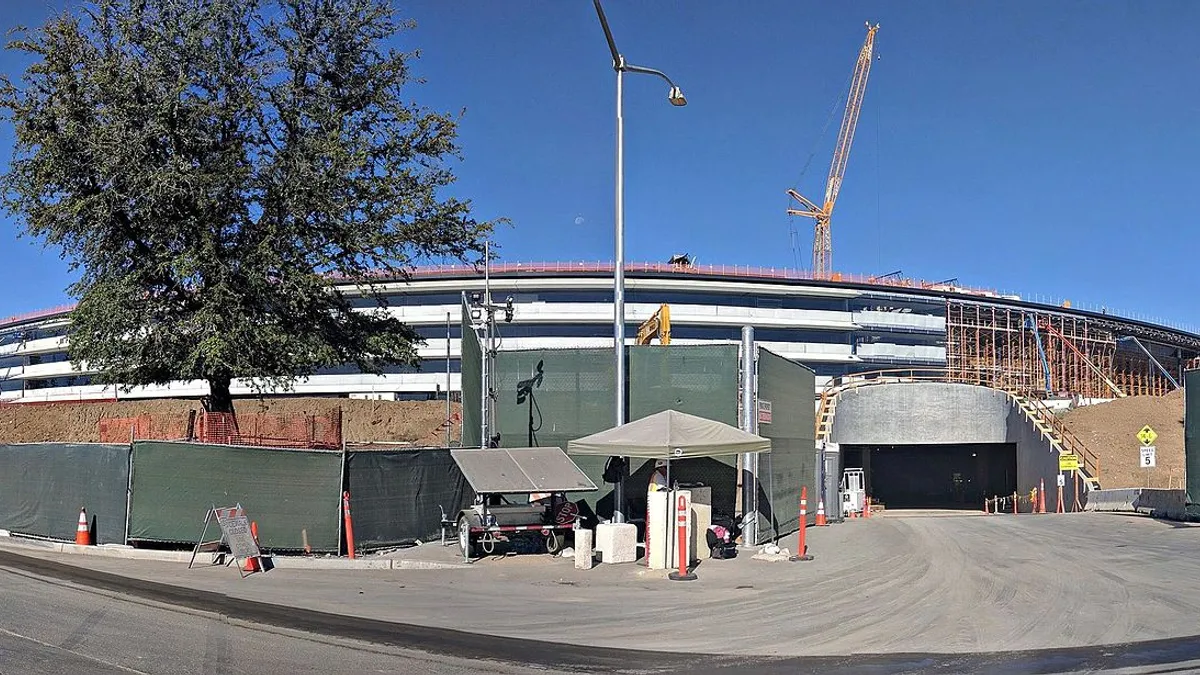Dive Brief:
- Air Systems Inc., a San Jose, California-based electrical subcontractor violated federal law by tolerating racial harassment of African-American workers at the Apple Park construction project in Cupertino, California, the U.S. Equal Employment Opportunity Commission charged in a lawsuit announced earlier this week. The harassment occurred between June 2016 and September 2017 when the affected employees were laid off.
- According to EEOC's suit, the harassment from individual workers included racist graffiti including swastikas and epithets drawn on the walls of the portable toilets around the jobsite, as well as a noose hung at the worksite with a scrawled note containing use of the racial insults, other expletives and a threat of lynching. The company allegedly failed to act when notified by two African-American employees that a white coworker had taunted them with a racial slur.
- The lawsuit alleges that the graffiti was present on a daily basis and that all ASI employees, including its managers, used the portable toilets. "ASI management admitted that it saw offensive graffiti but did not take action to remove it," it states.
Insight:
Title VII of the Civil Rights Act of 1964 prohibits harassment based on race and requires employers to take prompt action to investigate and stop the misconduct after they receive notice of it. After first attempting to reach a pre-litigation settlement through conciliation, the EEOC filed its lawsuit in U.S. District Court for the Northern District of California, San Jose Division. The EEOC's lawsuit seeks compensatory and punitive damages and injunctive relief designed to prevent such discrimination in the future.
"Federal civil rights law requires that employers take workplace harassment seriously," said EEOC San Francisco Regional Attorney Roberta Steele. "When alerted to the ugly and hateful speech and acts in this case, an employer must take swift and effective corrective action."
The accusations against the electrical subcontractor are many. Caucasian coworkers repeatedly used racial slurs in front of African-American employees and when the offended employees complained to managers, the suit states, the managers failed to take action, with one foreman responding about the slur, “It’s just a word, does it really bother you?”
The suit asks for compensation and punitive damages in amounts to be determined at trial.
ASI is part of the EMCOR Group, Inc., a Fortune 500 company that provides mechanical and electrical construction, industrial and energy infrastructure, and building services for a diverse range of businesses and government contracts. The 33,000-employee company's 2019 revenues are estimated to be approximately $8.9 billion, according to its website.
In response to the suit, Air Systems released a statement saying it treats employees with fairness, equality and respect, and has a zero-tolerance policy for discrimination and harassment.
"Upon learning of these troubling allegations, the company initiated a comprehensive investigation and took swift corrective actions, and we have cooperated fully with the U.S. Equal Employment Opportunity Commission during its review," a company spokesperson said in a statement. "We believe, however, that the complaint is without merit and we intend to vigorously defend against this lawsuit.”
While an EEOC guidance makes clear that petty slights, annoyances, and isolated incidents (unless extremely serious) will not rise to the level of illegality, employers are expected to investigate employee complaints and take action to prevent misconduct in the future. Additionally, experts say employers may want to focus on prevention, creating robust policies and implementing training.
The construction industry is no stranger to EEOC enforcement actions. Earlier this year, Colorado plumbing subcontractor AMI Mechanical settled an EEOC discrimination and retaliation suit, agreeing to pay $82,500 to two former employees. The EEOC said AMI created a hostile work environment by assigning its Latino plumbers to sewer duty while white plumbers with equal levels of experience were rarely or never required to work underground.
It also alleged that Latino plumbers were subjected to offensive comments and slurs. After one of the workers complained, a supervisor allegedly retaliated against him, telling the plaintiff to return to the sewer, threatening to replace him and referring to him using a pejorative term, the EEOC said. The supervisor reportedly also noted in the worker's personnel file that he had caused problems and was not eligible for rehire.
As part of a two-year consent decree, AMI agreed to review and revise its policies and procedures, encourage employees to report discriminatory conduct and provide training to its Colorado employees on how to prevent discrimination and retaliation. The company will also be required to post a notice in its Colorado worksites notifying employees of their right to a work in an environment free of national origin or color discrimination and retaliation.
Kate Tornone contributed to this article.















